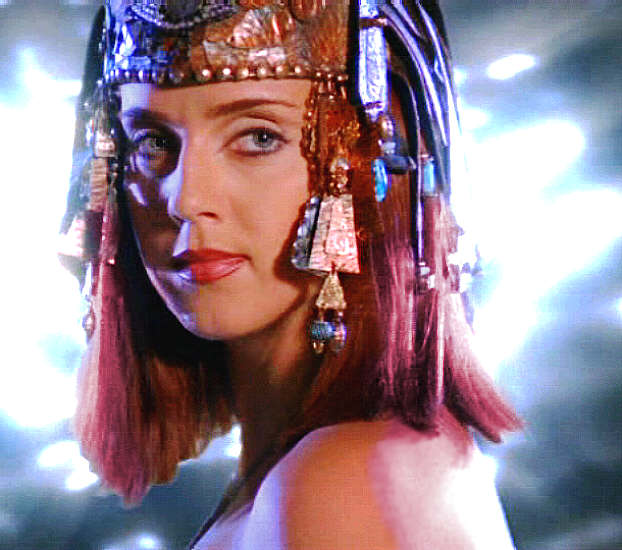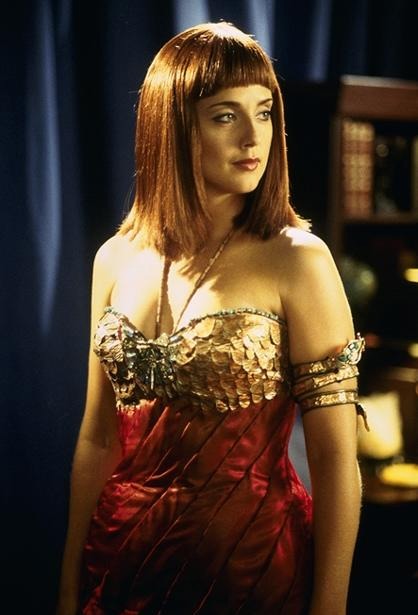
I'm going away for two weeks tomorrow and won't have access to the internet, so I won't be blogging again until the end of August - though I am taking several books I want to blog with me so should have plenty of material ready when I get back!
'Hathor' has to be one of the silliest episodes of Stargate ever filmed, but that is why I love it. I feel much the same way about Star Trek: Voyager's 'Threshold', an episode so bad it's actually been written out of Star Trek canon entirely. 'Hathor' is a completely ridiculous, borderline sexist episode but it is also one of those so-bad-it's-funny classics you see in SF and fantasy every now and again.
Early in the episode, we hear the following exchange between Daniel and Jack:
Daniel: Hathor was the Egyptian goddess of fertility, inebriety and music.
Jack: Sex, drugs and rock and roll?
Daniel: In a manner of speaking.
This is more or less true. Hathor was a goddess of fertility and music, and, therefore, was also associated with sexuality and with the pleasurable things in life in general. However, what this episode does is take her association with sexuality and fertility and run with it, mostly ignoring her association with music, and totally ignoring the fact that she was usually represented a woman with a headress of horns, a woman with cow's ears, or as a cow.
Most of the details of Hathor's mythology mentioned in the episode are fairly accurate, including the story about how she was sent to destroy the world by Ra, but then he changed his mind. On the science-fiction side of things, Hathor is presented as a 'queen bee' type creature who produces larvae which are then incubated by the Jaffa (people like Teal'c). It is possible that this was inspired by Hathor's title as mother of all Pharaohs. In Egyptian mythology, the Pharoah was identified with the god Horus, and Horus was a son of Hathor (in some versions - she was also considered the wife of Horus at Edfu). The script refers to her as the 'mother of all Pharaohs', because one of the titles of the Pharaoh was 'son of Hathor', so that may have been what inspired the writers to give her the 'queen bee'
 function.
function.Bronze arched sistrum (musical instrument) with Hathor head decoration. Egypt, Late Period, after 600 BC. From the British Museum online catalogue.
There is, however, one rather odd reference to the ancient myths. About halfway through the episode, Carter and Doc Frasier are doing some research on Hathor, and Carter finds a website:
Carter: This one academic's web page theorises that a bunch of the sex goddesses from different cultures were actually the same woman - Hathor. The Greeks identified her with Aphrodite. There's Ishtar of Babylon, Astarte of Syria, Ceres of Rome.
Carter does point out that this is really Daniel's area and she's not sure what she's doing. But the really weird thing about this bit is that this is not the theory of a modern academic with a website. This is the sort of theory put forward by ancient academics - by philosophers and theologians and scholars in the Greek and Roman periods. Ancient scholars did not necessarily believe wholehearteredly in a particular myth or dogma - that was one of their problems with Christianity as a concept. However, they also would not necessarily assume that all the ancient deities were entirely fictitious, but rather that the different myths represented different aspects of the same truth. In a separate but related trend, as people travelled and traded and, eventually, were conquered by the Romans, different religious traditions and rituals became conflated with each other, so gods and goddesses worshipped under different names in different traditions were considered to be, broadly speaking, identifiable with each other. Called syncretism, this was a very common phenomenon in the ancient world, and Hathor herself was eventually subsumed by another Egyptian goddess, Isis, with whom she had long been identified.
The strange thing about the Stargate reference is that Carter makes it sound like it is a modern academic (with web technology!) who has created this 'theory'. Part of the reason for this is that, in the show, all these deities actually are real alien beings, but it still seems like a bit of a weird gap in the otherwise pretty good research done for the show. Surely Carter could just as easily have found out that the ancients considered all these goddesses to be the same deity? But then, she did say it wasn't her area. The actual identifications aren't totally out of the realm of possibility. Ceres was a goddess of fertility as it related to farming rather than to human reproduction, but she was identified with Isis, who was identified with Hathor.
The episode actually opens with an archaeological dig in Mexico, in a Mayan temple, where a group of archaeologists are surprised to find a sarcophagus with Egyptian hieroglyphics. As so often happens to archaeologists on TV, all their messing around with the sarcophagus opens it up and out crawls Hathor, who kills them. Luckily some of their team were outside and the appearance of Egyptian hieroglyphs in a Mayan temple makes them think of Daniel. This seems to be the first appearance of a sarcophagus in the television show, which is interesting. One of the problems with Stargate's sarcophagi for a long-running series is that they bring people back to life, which makes it hard to kill anyone or to create real tension and danger. This episode solves that problem by having it destroyed after it's been used, which seems wise.

What makes the episode so silly (in case those of you who haven't seen it were wondering!) is that Hathor's sexual power is translated here into a horrifically cheesy magical power over men (explained as some sort of chemical influence but really, there's not much point bothering with the science of it). She breathes her purple mojo on them and they become putty in her hands. The result is that the entire base, bar the few women on it and Teal'c (protected by being a Jaffa) are completely in her power. Then she has sex with Daniel for his sperm, produces hundredsof larva babies and tries to make Jack her first Jaffa (i.e. a human incubator for one of the larva babies). All of which is the direct result of two acts of stupidity at the beginning of the episode, when Daniel has a fit of chivalry and un-cuffs her, despite the fact she was trying to break in to the base and Hammond, despite everything he's seen so far, believes Jack when he calls Hathor delusional and agrees to have his hand kissed, in order to play in to her delusions. All in all, it's not Stargate's finest hour.
The men vs women plot does have some compensations. I love the conversation between Carter and Doc Frasier about being 'one of the guys', and about Frasier's ex-husband calling the Air Force 'this man's army'. Carter actually comments on the paucity of women on the base as well, which is nice to hear and which provides the show with a neat excuse for the ratio of men to woman: whereas, for example, Star Trek has no excuse for having male crewmen outnumber female, because it's set in a supposedly egalitarian future, Stargate can claim that it is simply representing the current make-up of the United States Air Force. The bit where they all have to flirt with the men to get out of their cell is very funny too and seeing Doc Frasier trying to be a soldier provides a nice opportunity to see an identifiable female character for those of us not of the military persuasion.
Still, this cannot quite make up for the fact that Hathor appears to be wearing an outift that bears a certain resemblence to the famous gold bikini of Princess Leia, or all those odd shots of her in a bathtub surrounded by swarming larvae. You also have to wonder why she doesn't just work her mojo on at least some of the women as well, though there might be an argument that, since her power is related to
 fertility, it only works on a female/male basis that could lead to procreation. Afterwards, the men don't seem to remember anything, which saves them from having to angst about the fact Daniel was essentially date-raped and then all his larva babies were killed, though he does look a bit depressed when he works it out. Still, if this was Farscape, there would have been a lot more angst about that. On the other hand, at least he didn't just abandon his lizard babies on some planet in the Delta Quadrant.
fertility, it only works on a female/male basis that could lead to procreation. Afterwards, the men don't seem to remember anything, which saves them from having to angst about the fact Daniel was essentially date-raped and then all his larva babies were killed, though he does look a bit depressed when he works it out. Still, if this was Farscape, there would have been a lot more angst about that. On the other hand, at least he didn't just abandon his lizard babies on some planet in the Delta Quadrant.I have to admit, on viewing this episode again, I was surprised at just how accurate a lot of the information on Hathor was. Aside from the misunderstanding, or misappropriation, of syncretism, the writers genuinely had done their research. (And they left out the cow part, but that's hardly surprising. In fact, given the set-up of the series, they missed some great opportunities to show alien Eyptian gods that actually had jackal's heads and falcon's heads and so on). Even better, the science fiction elements of Hathor's character do seem to have been inspired by her real mythological roots, which is pretty impressive and a nice way of adopting and adapting ancient mythology for a modern audience. It's just a shame that the eventual episode, in both script and direction, was somewhat mishandled and came over as cheesy, patronising (I'm not sure if it's more patronising to men or to women!) and supremely silly. Still, points for effort and for producing something that can give us all a good laugh on a rainy evening.
I didn't know Threshold had been written out of Star Trek canon - that makes me sad... (Even my Dad remembers it - when we watching Resolutions the other day he asked if it was the one with the lizard babies, and I had to correct him!)
ReplyDeleteI was always quite amused by Hathor's bathtub of larvae though... *g*
While I don't recall Threshold specifically, I can't forget Hathor.
ReplyDeleteBy the way, I absolutely love this blog. I just happened to stumble across it, but will be following from here on.
Wonderful stuff!
What?! These were both fabulously fun episodes!!! Just the idea of lizard Janeway and a "pregnant" O'Neill brings a massive smile to my face! :o)
ReplyDeleteEnjoy your holidays! I've got a week off now as well and am enjoying it in Mallorca with my cousins. ;o)
I love the picture of the sistrum Julz
ReplyDeleteMarsia
Thanks Marsia and Brad!
ReplyDeleteGemma, I think it was when I told Mum that Threshold had been written out that she forgave Voyager for it!
Chris, hope you enjoyed your holiday!
Hathor with her deep voice in the bathtub... mmm...
ReplyDeleteYou obviously don't understand StarGate. It's suppose to be silly, it's comic book type of sci-fi. And there are dozens of much sillier episodes in SG-1 (not to mention Atlantis).
ReplyDelete